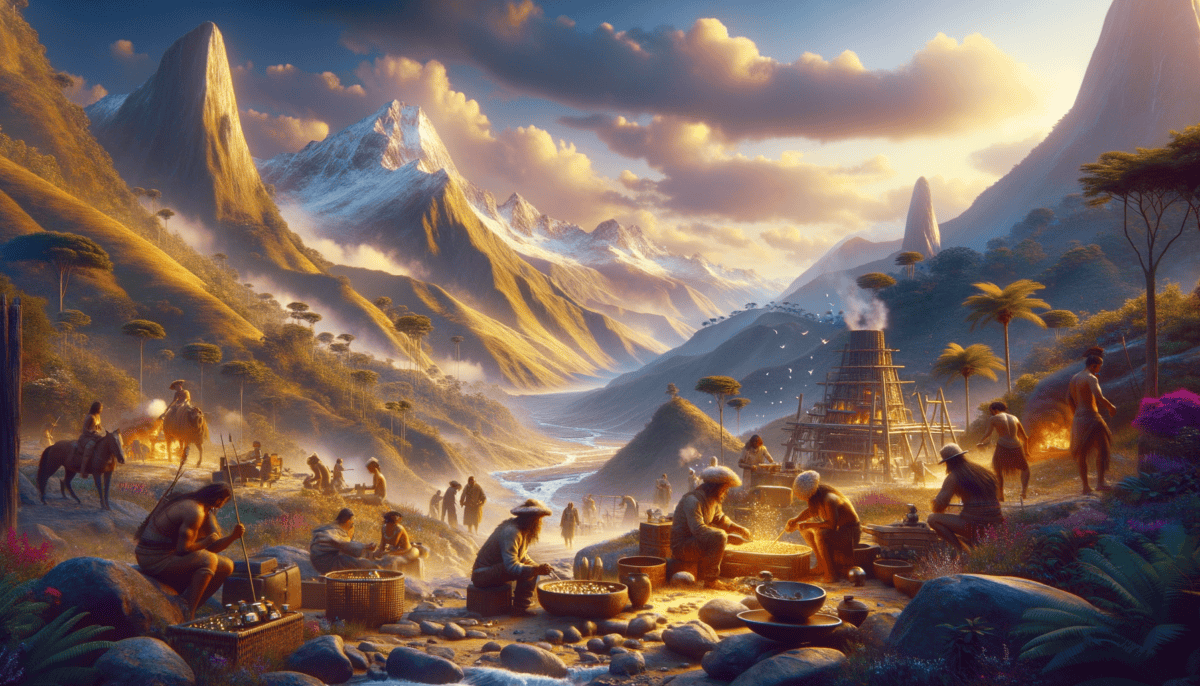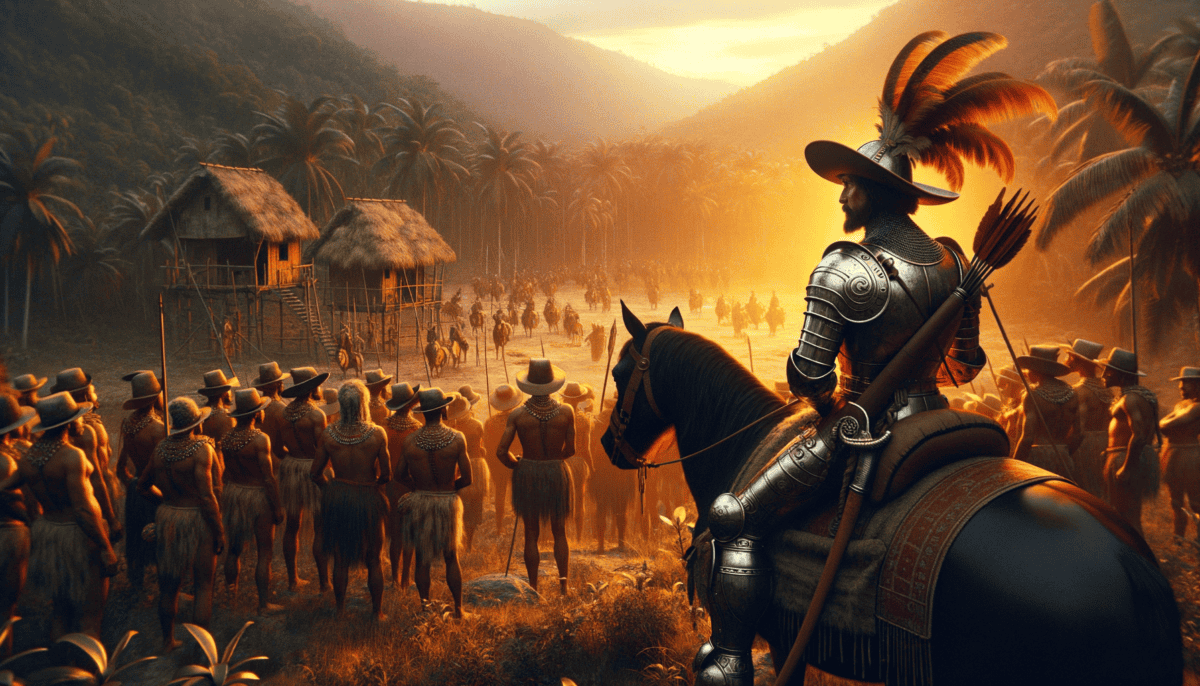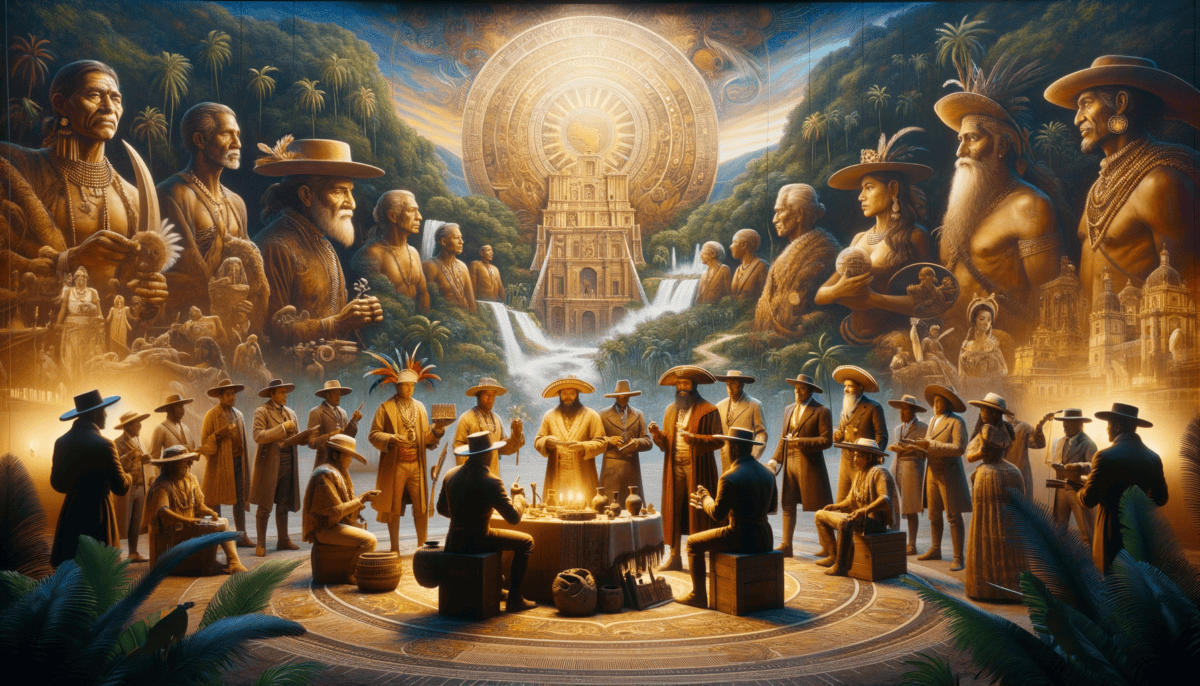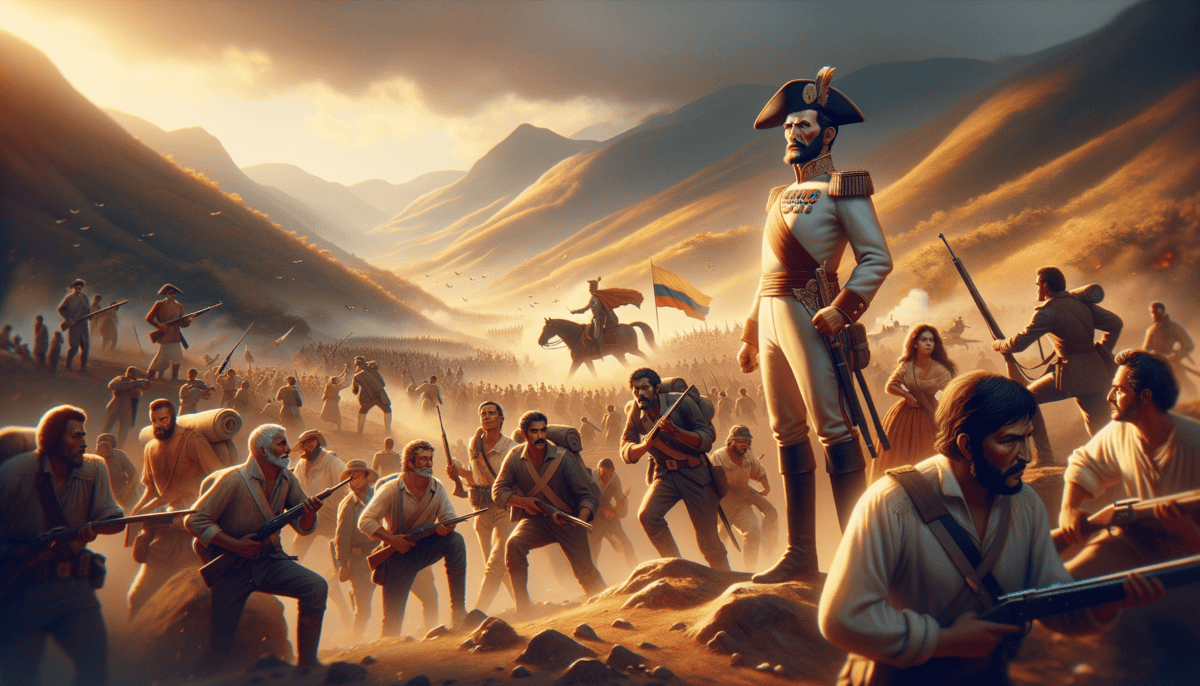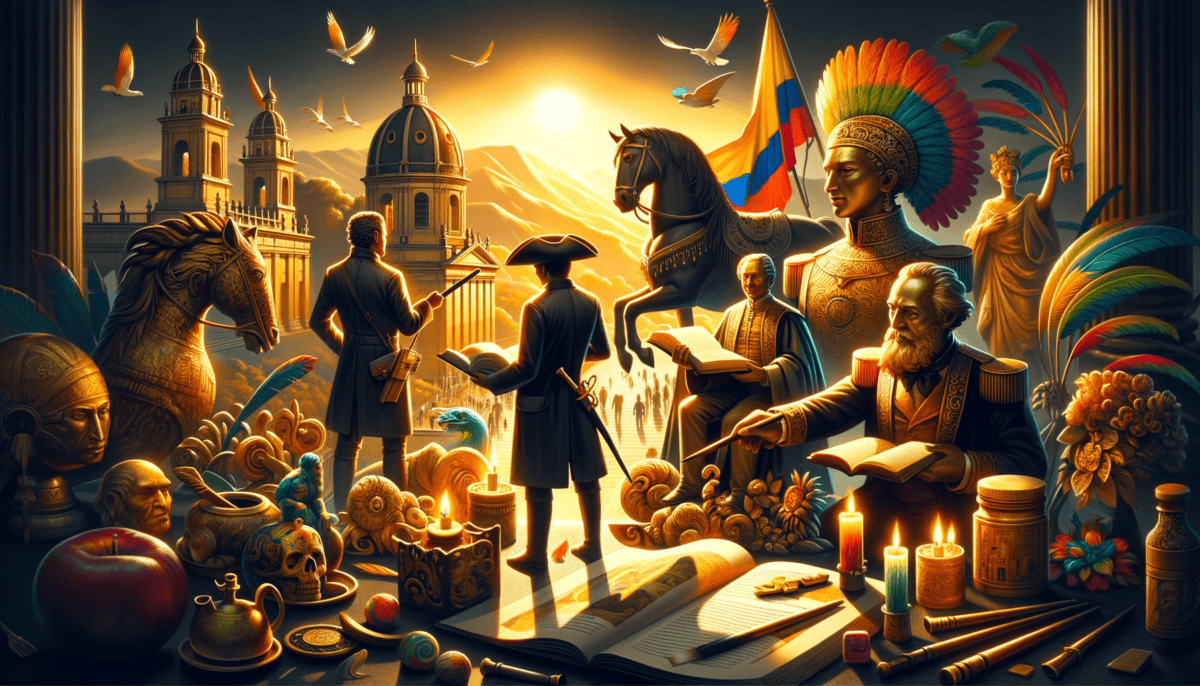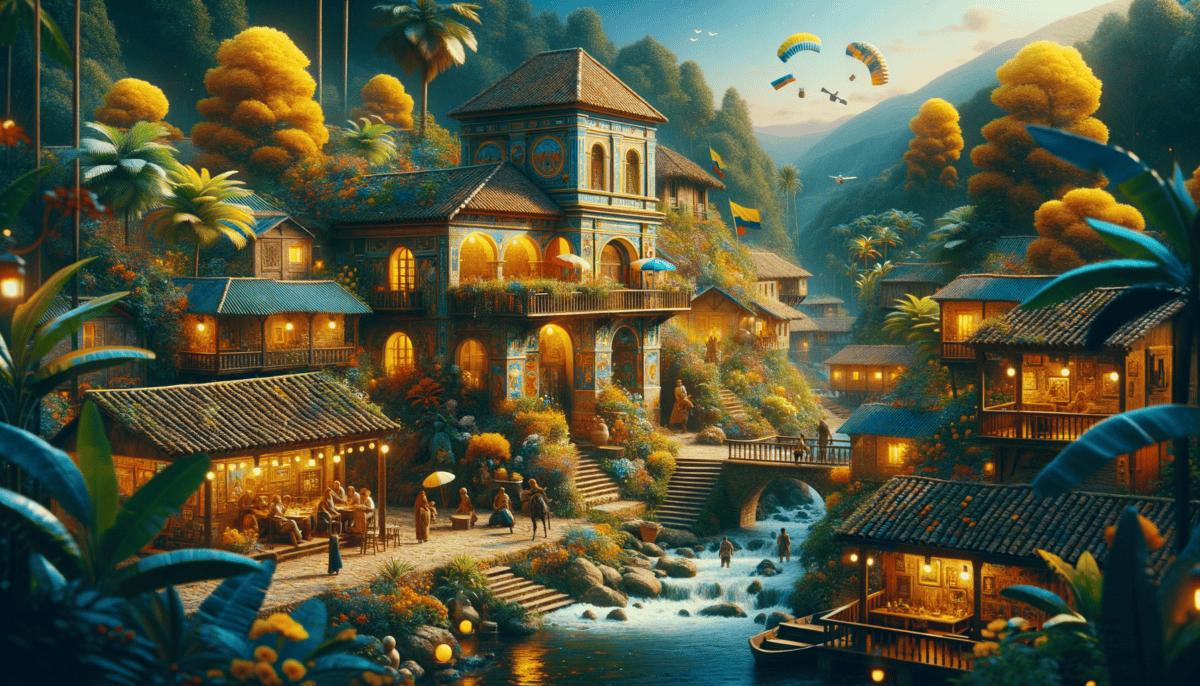Seeds of Civilization
High in the misty mountains of Colombia, where the air is crisp and cool, lived a special group of people called the Muisca. They made their home in a beautiful place called the Bogotá savanna, where green fields stretched as far as the eye could see. ️
"Look at the sun rising over our sacred lakes," said Chief Zipa to his young daughter, Luna. "Our people have lived here for thousands of years, and these waters hold our stories."
Luna loved hearing about her people's ways. The Muisca were very clever with gold. They didn't just make pretty things – they created special objects for ceremonies and to honor their gods.
Every morning, Luna watched the skilled craftspeople at work. They would heat the gold until it glowed like the sun, then shape it into beautiful things:
- Sacred masks that sparkled in the light
- Tiny golden boats for ceremonies
- Special jewelry for the chiefs
- Decorations for their temples
- Offerings for their gods
"Why do we make so many golden things?" Luna asked her father one day.
Chief Zipa smiled. "Gold is sacred to us, little one. When we craft these special objects, we're not just making pretty things – we're telling our stories and honoring our beliefs."
The Muisca lived differently from how we live today. They grew foods like corn and potatoes in their fields. They traded with other groups, sharing salt and emeralds for things they needed. Their society was organized, with leaders called Zipas and Zaques who helped make important decisions.
One special evening, as the sun painted the sky orange and purple, Luna sat by Lake Guatavita with her father. This lake was very important to the Muisca people.
"This is where our most special ceremony happens," Chief Zipa explained. "The new chief covers himself in gold dust and rides a raft to the middle of the lake. There, he drops golden gifts into the water as offerings to our gods."
Luna's eyes grew wide. "Is that why people call us El Dorado?"
"Yes, little one. But they don't understand that for us, gold isn't about being rich. It's about connecting with our gods and keeping our traditions alive."
As night fell over the mountains, Luna looked up at the stars twinkling above Lake Guatavita. She felt proud to be part of such an amazing people. Their story wasn't just about gold – it was about wisdom, respect for nature, and living in harmony with the world around them.
The cool mountain breeze carried the sound of flutes and drums from the village. Another ceremony was beginning, another chance to honor their traditions. Luna smiled, knowing she was part of something special – a civilization that had found its own path to greatness in these beautiful Colombian mountains.
The mountains held many more stories of the Muisca people, stories that would shape the future of their land in ways they couldn't imagine. But for now, under the starlit sky, their golden civilization continued to shine, leaving marks that would last forever in the history of Colombia.
Winds of Change
The morning sun cast long shadows across the Bogotá savanna as strange ships appeared on the horizon. The year was 1536, and life for the Muisca people was about to change forever.
“Father, who are these men with shiny clothes?” Luna whispered, clinging to Chief Zipa’s arm. The Spanish conquistadors, led by Gonzalo Jiménez de Quesada, marched into their lands wearing metal armor that gleamed in the sunlight.
The Spanish soldiers looked very different from anyone Luna had ever seen. They rode on strange animals called horses and carried long metal sticks that made loud noises like thunder. Their leader, Quesada, stepped forward with a serious face.
“We claim this land in the name of Spain,” Quesada announced through a translator. His words echoed across the quiet valley.
Chief Zipa stood tall and proud. “Our people have lived here for many generations. This is our sacred home.”
Life began to change quickly. The Spanish were very interested in the Muisca’s golden treasures. But they didn’t understand that these weren’t just pretty things – they were sacred objects that told the Muisca’s stories.
“Remember, Luna,” Chief Zipa whispered one evening, “no matter what happens, keep our stories in your heart. Our true wealth isn’t in gold – it’s in our wisdom and traditions.”
The Spanish brought new things to the Muisca lands:
- Different languages and customs
- New types of food and animals
- Different ways of building houses
- New religions and beliefs
- Different ways of trading
“Why do they want to change everything?” Luna asked her father one day, watching Spanish workers build a church where their temple once stood.
“They see the world differently than we do,” Chief Zipa explained gently. “But remember, even as things change, who we are inside stays the same.”
As months passed, more Spanish people arrived. They built new towns with different kinds of buildings. They started new farms and brought their own animals. The sound of Spanish words mixed with Muisca language in the marketplaces.
Luna watched as her world transformed. The sacred Lake Guatavita, once a place of quiet ceremony, now echoed with the sounds of Spanish boats searching for gold. The mountains still stood tall, but the paths that wound through them carried different footsteps now.
Yet even as their world changed, some things remained. The Muisca people kept their stories alive, whispering them to their children at night. They wove their ancient patterns into new clothes, and their traditional songs found new voices.
One evening, as Luna watched the sunset paint the changed landscape in familiar colors, she remembered her father’s words about keeping their stories in her heart. The wind still carried the spirit of her people through the valley, and in that wind, she heard the promise of something new – a place where old and new might someday learn to dance together.
Whispers of Freedom
The year was 1810, and the streets of Bogotá buzzed with excitement. After years of Spanish rule, people were starting to dream of something new – freedom!
Young María sat at her window, listening to the whispers in the streets below. Her father, Antonio, was one of the many creoles (people born in Colombia to Spanish parents) who wanted change.
“Papa, tell me again about the man they call El Libertador,” María asked, her eyes bright with curiosity.
Antonio smiled and sat beside her. “Ah, Simón Bolívar! He dreams of making our land free. He says we should rule ourselves, not be ruled by Spain from far away.”
In secret meetings across the city, people gathered to talk about independence. They wanted to make their own rules and decide their own future. But it wasn’t easy – Spain had been in charge for almost 300 years! ️
One day, María watched as a crowd gathered in the town square. A man stood up to speak:
“Brothers and sisters! We were born in this beautiful land. We love these mountains, these valleys, these rivers. Shouldn’t we have a say in how our home is run?”
The crowd cheered loudly. More and more people were joining the independence movement. They had many reasons for wanting change:
- They wanted to make their own laws
- They wanted fair treatment for all people
- They wanted to trade freely with other countries
- They wanted to keep more of their money in Colombia
- They wanted to protect their culture and traditions
News arrived that Simón Bolívar was gathering an army. He traveled through towns and villages, talking to people about freedom. Many joined his cause, ready to fight for independence.
“We might not see the changes right away,” Antonio told María, “but we’re planting seeds of freedom that will grow into something beautiful.”
The movement grew stronger every day. People wrote secret messages, held meetings at night, and made plans. Even children like María helped by carrying messages between the independence leaders.
One evening, as María helped her father prepare for another secret meeting, she asked, “Are you scared, Papa?”
Antonio hugged her tight. “Yes, mi amor. But sometimes being brave means doing what’s right even when you’re scared. We’re fighting for your future, and the future of all children in our land.”
The winds of change were blowing through Colombia. In homes, markets, and meeting places, people spoke of freedom. They imagined a new country where everyone would have a voice. The dream that started as a whisper was growing into a mighty roar.
The Fire of Freedom
The sun rose over the Andes Mountains as Simón Bolívar led his army through the steep paths. It was 1819, and the fight for freedom was in full swing! ⚔️
Little Juan watched from behind a tree as soldiers marched past his village. His father had joined Bolívar’s army last month. The boy clutched a small wooden sword his father had carved for him.
“One day, mi hijo, you’ll tell your children about how we won our freedom,” his father had said before leaving.
Bolívar’s army faced big challenges. They needed to:
- Cross high mountains in cold weather
- Find food and supplies for the soldiers
- Fight against Spanish troops who knew the land
- Keep their plans secret from enemy spies
- Help wounded soldiers get better
In the army camp, soldiers gathered around campfires at night. They shared stories about their homes and families. Some played guitars and sang songs about freedom.
“General Bolívar,” a young soldier asked one evening, “what will our country be like when we’re free?”
Bolívar smiled and spoke with passion: “It will be a place where all people are treated fairly. Where children can grow up proud of their homeland. Where we make our own choices about our future.”
The biggest battle was coming. Bolívar had a clever plan to surprise the Spanish army. His soldiers would climb the mountains where no one expected them to go!
María, now helping as a messenger, brought important news: “The Spanish soldiers think it’s impossible to cross the mountains in this weather. They won’t be ready for us!”
Finally, they reached the Boyacá bridge. The Spanish army was shocked to see them! The battle was fierce, but Bolívar’s army fought bravely.
“For freedom!” the soldiers shouted as they charged forward.
When the fighting ended, Bolívar’s army had won! It was a huge victory that would help Colombia become free. People celebrated in the streets, waving flags and singing songs.
Back in Juan’s village, news of the victory brought joy and hope. His mother hugged him tight and said, “Your father helped make history today, mi amor. We’re going to build a new country together!”
Bolívar gathered his soldiers and spoke: “This is just the beginning, my friends. We’ve won an important battle, but our real work starts now. We must build a country that’s fair and good for everyone.”
The dream of independence was becoming real. The people of Colombia had shown that with courage, unity, and hope, they could change their world. The fire of freedom was burning bright and would light the way forward.
Dreams Take Flight
The year was 1819, and the sweet taste of victory filled the air in Bogotá. People danced in the streets, their faces glowing with joy. The battle at Boyacá Bridge had changed everything!
“Papa, tell me what happens now,” little María asked her father, who had just returned from Bolívar’s army. They sat on their porch, watching celebrations in the town square.
“Now, mi princesa, we build something beautiful – our own country called Gran Colombia!” her father said, his eyes sparkling with hope.
Bolívar had a big dream. He wanted to create a huge country that would include:
- Modern-day Colombia
- Venezuela
- Ecuador
- Panama
- Parts of Peru and Brazil
In the new capital of Bogotá, leaders gathered to write laws for their new country. Francisco de Paula Santander, Bolívar’s friend, helped create schools so children could learn to read and write.
“We must teach our children,” Santander said during a meeting. “Knowledge will make our country strong!”
But building a new country wasn’t easy. Some people disagreed about how things should be done. Venezuela and Ecuador wanted to make their own choices.
María noticed changes in her town. New shops opened, and traders came from far away places. Artists painted beautiful pictures of the mountains and valleys. Musicians wrote songs about freedom.
“Look, María!” her mother pointed to a new flag flying in the town square. “Yellow for our gold, blue for our oceans, and red for the blood of our heroes.”
In schools, teachers shared stories of brave indigenous chiefs, clever revolutionaries, and kind helpers who made Colombia special. Children learned to speak Spanish but also kept their families’ traditional languages.
“Remember,” María’s teacher said, “our differences make us stronger, like different colored threads in a beautiful blanket.”
Some problems were hard to solve. Different groups wanted different things. But people worked together to find answers. They learned that building a country takes time and patience.
One evening, María sat with her grandmother, watching the sunset over the Andes. “Abuela, will our new country last forever?”
Her grandmother smiled wisely. “Mi amor, countries are like gardens. They need care, love, and time to grow strong. We must all help tend this garden.”
By 1830, things were changing again. Venezuela and Ecuador decided to become their own countries. It made some people sad, but others understood that each place needed to find its own way.
Still, Colombia kept growing stronger. People wrote books, built universities, and created beautiful art. They traded with other countries and shared their stories with the world.
María grew up watching her country change and bloom. Years later, she would tell her own children: “We didn’t just win freedom – we built something new and wonderful together.” ⭐
A New Dawn
The sun rises over modern Colombia, painting the sky in brilliant colors. The streets of Bogotá buzz with life and energy. Music flows from cafes, and the smell of fresh arepas fills the air.
“Abuela, tell me again how our country changed,” says little Carlos, sitting with his grandmother in their rooftop garden overlooking the city.
She smiles, pointing to the colorful street art below. “Look at those walls, mi amor. They tell our story – from gold-working Muiscas to brave fighters for freedom, to who we are today.”
• Beautiful music that makes the world dance
• Stories that win big prizes
• Coffee that wakes up the world
• Kind people who welcome visitors
• Colorful festivals that celebrate life
“Our writers, like Gabriel García Márquez, tell magical stories that people love all around the world,” Abuela explains, showing Carlos a beloved book. “He won a very special prize called the Nobel Prize!”
Carlos watches cyclists zoom past on special Sunday bike paths. “Every week, our city closes streets to cars so people can ride bikes and play. We call it ‘Ciclovía’ – it’s like a big party!”
“We learned that taking care of each other makes everyone stronger,” Abuela says, watering her rooftop plants. “Just like these flowers need sun and water, people need peace and kindness to grow.”
In schools, children learn about protecting the rainforest. Scientists discover new animals and plants. Artists paint murals that tell stories of peace. Musicians mix traditional sounds with new beats.
“But most special of all,” Abuela says, hugging Carlos, “is how we keep hoping and trying, even when things get hard. That’s what makes us Colombian.” ❤️
Down in the plaza, people from all over the world taste Colombian coffee and chocolate. Tourists snap photos of gold museums and colonial churches. Students learn in new universities. Farmers grow flowers that brighten homes across the globe.
As evening falls, Carlos and Abuela join their neighbors for a street festival. There’s dancing, laughter, and the warm smell of empanadas in the air.
“Remember, mi amor,” Abuela whispers to Carlos, “our story isn’t finished. Each day, we write new chapters together.”
The stars twinkle over Colombia’s mountains, valleys, and seas. In cities and villages, people dream big dreams. They work together to make their country better. They remember their past while building their future.
And in millions of homes, just like Carlos’s, children listen to stories of their land – stories of gold and dreams, of battles and peace, of magic and hope. They learn that they too will help write Colombia’s next chapter.
As night falls over the Andes, Carlos looks up at the stars and smiles. He knows that tomorrow brings new adventures, new chances to make Colombia shine even brighter. The story continues, beautiful and full of promise.

